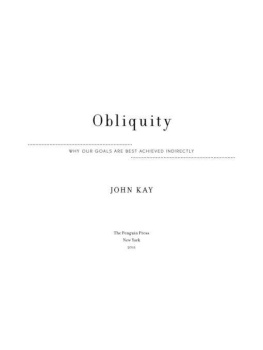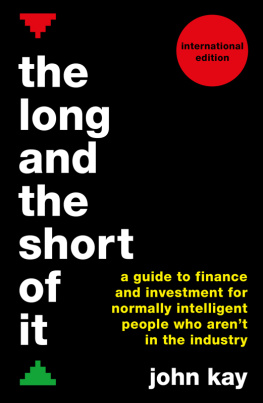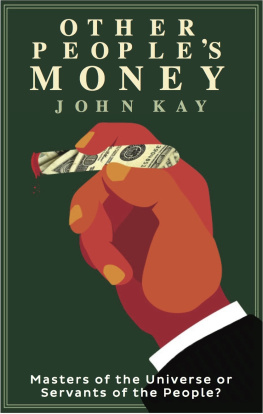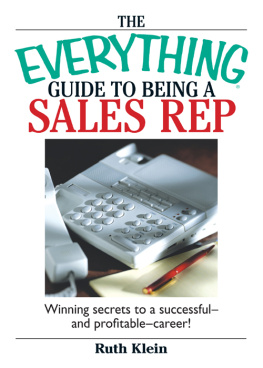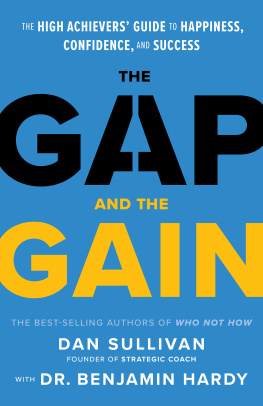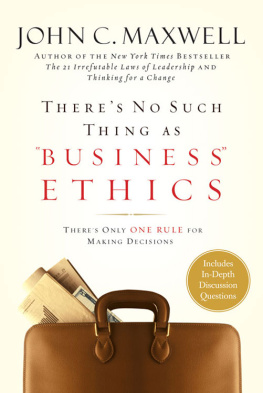Table of Contents
THE PENGUIN PRESS
Published by the Penguin Group
Penguin Group (USA) Inc., 375 Hudson Street, New York, New York 10014, U.S.A. Penguin Group (Canada), 90 Eglinton Avenue East, Suite 700, Toronto, Ontario, Canada M4P 2Y3 (a division of Pearson Penguin Canada Inc.) Penguin Books Ltd, 80 Strand, London WC2R ORL, England Penguin Ireland, 25 St. Stephens Green, Dublin 2, Ireland (a division of Penguin Books Ltd) Penguin Books Australia Ltd, 250 Camberwell Road, Camberwell, Victoria 3124, Australia (a division of Pearson Australia Group Pty Ltd) Penguin Books India Pvt Ltd, 11 Community Centre, Panchsheel Park, New Delhi110 017, India Penguin Group (NZ), 67 Apollo Drive, Rosedale, North Shore 0632, New Zealand (a division of Pearson New Zealand Ltd) Penguin Books (South Africa) (Pty) Ltd, 24 Sturdee Avenue, Rosebank, Johannesburg 2196, South Africa
Penguin Books Ltd, Registered Offices: 80 Strand, London WC2R ORL, England
Copyright John Kay, 2010 All rights reserved
Illustration credits:
Pages 7, 58, 112, 113 (The Watson Test, part 1): Sue Lamble
9 (top): Roger Viollet / Getty Images
9 (bottom): Getty Images
56 (top): Superstock
56 (bottom): Private collection / James Goodman Gallery, New York, USA / Bridgeman
95: From Blastland and Dilnot
113 (photographs, left to right): Bob Barkany; Juan Silva; DAJ; Image Source
117: ML Design
LIBRARY OF CONGRESS CATALOGING IN PUBLICATION DATA
Kay, J. A. (John Anderson)
Obliquity : why our goals are best achieved indirectly / by John Kay.
p. cm.
Includes bibliographical references and index.
eISBN : 978-1-101-47639-0
1. Success. 2. Goal (Psychology) I. Title.
BF637.S8K39 2011
153.8dc22
2010030269
Without limiting the rights under copyright reserved above, no part of this publication may be reproduced, stored in or introduced into a retrieval system, or transmitted, in any form or by any means (electronic, mechanical, photocopying, recording or otherwise), without the prior written permission of both the copyright owner and the above publisher of this book.
The scanning, uploading, and distribution of this book via the Internet or via any other means without the permission of the publisher is illegal and punishable by law. Please purchase only authorized electronic editions and do not participate in or encourage electronic piracy of copyrightable materials. Your support of the authors rights is appreciated.
http://us.penguingroup.com
PREFACE
F or over ten years, I built and ran an economic consultancy business, and much of our revenue was derived from selling models to large corporate clients. One day I asked myself a question: If these models were helpful, why did we not build similar models for our own decision making? The answer, I realized, was that our customers didnt really use these models for their decision making either. They used them internally or externally to justify decisions that they had already made.
They were playing what I now call Franklins gambit, after Benjamin Franklin. He wrote: So convenient a thing is it to be a reasonable creature, since it enables one to find or make a reason for everything one had a mind to do. Franklins remark about hindsight rationalization is particularly significant, not just because he was a clever man but because, as I will describe in chapter ten, he has come to be regarded as the founding father of scientific decision making.
Of course, we told ourselves privately, our clients were being stupidthat was why they didnt use our models. But we didnt think we were stupid, and we didnt use them either. I can remember a couple of occasions on which a spreadsheet analysis did help us to solve problems of our own, both of them related to the financing of the business. But that was all.
Like many economists we believed that if our models did not describe the world, the fault lay with the world, not the model. But it isnt just economists who make that mistake. Politicians, investors and bankers, businesspeople believe that although they dont solve problems according to a standard model of rational decision making, they ought to. So they pretend that they doto others, and perhaps to themselves.
We prefer to tell stories than to use analytic models, and the best and most helpful models are, at their root, narratives. This book presents its messages through stories because, as every teacher or consultant knows, that is the method through which we best absorb arguments and make sense of a complex world. But stories can mislead as well as inform; we must build our stories from the evidencenot, as in Franklins gambit, build our evidence to match narratives we have previously constructed.
It is more than a decade since I escaped from an activity of which I was increasingly skeptical. Since then, I have seen disasters perpetrated by people who played Franklins gambit in both politics and business, in Iraq and on Wall Street. Mistakes made by those who could find a reason for everything they had a mind to do, and did: who tried to make the world conform to their view of the world.
These failures of both policy and prediction have encouraged economists and other social scientists to look at what people actually do rather than imposing on them models of how economists think people should behave. One popular book with this approach adopts the title Predictably Irrational . But this title reflects the same mistake that my colleagues and I made when we privately disparaged our clients for their stupidity. If people are predictably irrational, perhaps they are not irrational at all: Perhaps the fault lies not with the world but with our concept of rationality. Perhaps we should think differently about how we really make decisions and solve problems. Perhaps we should recognize the ubiquity, and inevitability, of obliquity.
The term obliquity was suggested to me by Sir James Black, the Nobel Prizewinning pharmacologist whose contribution to the development of ICIs pharmaceutical business is described in chapter three. In the course of verifying that history, I talked to Black about his reasons for leaving ICI to join another British pharmaceutical company, SmithKline. At SmithKline Black discovered another blockbuster drug, and the indirect effect was to stimulate a third company, Glaxo, to create and market Zantac, which would become the worlds best-selling prescription drug.
Black probably created more shareholder value than any other man in postwar British business, but his motivation was to pursue chemistry, not profit. He left ICI, he told me, because his interests were in furthering his research, not helping to market his discoveries. I used to tell my colleagues [at ICI] that if they wanted profits, there were many easier routes than drug research. How wrong could I have been! he told me, and went on, I call it the principle of obliquity: Goals are often best achieved without intending them.
Black died two days before the first, British, edition of this book was published. I hope it is not presumptuous to dedicate this American edition to a British scientist whose modesty was as remarkable as his talent.
Chapter 1
OBLIQUITYWhy Our Objectives Are Often Best Pursued Indirectly
I never, indeed, wavered in the conviction that happiness is the test of all rules of conduct, and the end of life. But I now thought that this end was only to be attained by not making it the direct end. Those only are happy (I thought) who have their minds fixed on some object other than their own happiness; on the happiness of others, on the improvement of mankind, even on some art or pursuit, followed not as a means, but as itself an ideal end. Aiming thus at something else, they find happiness by the way.

